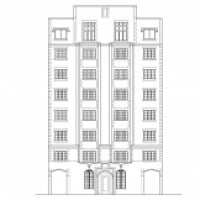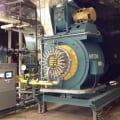Welcome! Here are the website rules, as well as some tips for using this forum.
Need to contact us? Visit https://heatinghelp.com/contact-us/.
Click here to Find a Contractor in your area.
If our community has helped you, please consider making a contribution to support this website. Thanks!
Steam Trap Testing Using Ultrasonic Tester
Options
Ed. W.
Member Posts: 28
Does anyone have experience with Testing Radiator Traps with a Ultrasonic Tester? Best make and model to purchase?
0
Comments
-
What is an ultrasonic tester?
The only way I know which can identify bad traps is the temperature method: if the outlet temperature is too hot, the traps is not closing as it should, and conversely, if cold, the trap is not open.
An IR Camera could make this easier.--NBC0 -
I'd like to know what people suggest for testing traps too, an IR thermometer or camera or...?0
-
I use both.ChicagoCooperator said:I'd like to know what people suggest for testing traps too, an IR thermometer or camera or...?
0 -
Thanks, any suggestions for one or the other?Abracadabra said:
I use both.ChicagoCooperator said:I'd like to know what people suggest for testing traps too, an IR thermometer or camera or...?
0 -
I use a basic laser thermometer.. i think it's a Ryobi.ChicagoCooperator said:
Thanks, any suggestions for one or the other?Abracadabra said:
I use both.ChicagoCooperator said:I'd like to know what people suggest for testing traps too, an IR thermometer or camera or...?
For IR I use a Seek Thermal attachment for my tablet/smartphone.0 -
Thanks, I'm going to check some out today/tomorrow.
Since I use a brick, I mean old dumbPhone, that other stuff isn't realistic for me.0 -
I have used Tempil Sticks, IR Temp. Sensor and a IR Camera. The Camera is the easiest .0
-
We hired a service that used an ultrasonic tester specifically to find a leaking trap on a reducing station. there were 15 traps and steam was venting from condensate receiver to roof vent. They said all traps were fine.
We isolated the station and started rebuilding all of the traps. we found four destroyed. I dont have a lot of confidence in them.0 -
I have a fair amount of experience in this since it's what I do. Sorta.
Temperature is reasonably accurate most of the time, if the discharge delta is something like 5 degrees then the trap is likely failed. But it also could be the trap upstream of it filling the return line and giving a false reading.
But temperature with something like a FLIR is REALLY handy, especially in a plant because you can scan the room and find the hot stuff fast. Also just handy in general or to impress your kids.
But ultrasound is the last word. It's actually a little faster than temp because you just walk up to trap and touch with probe wearing headphones. You'll know a bad trap when you hear it, they are fairly obvious like holding open an air chuck. The steam ripping through the orifice creates the ultrasonic signature around 25-35 kHz.
So here's what I have an recommend:
Thermal Camera:
FLIR E8- Awesome, expensive, other cheaper options out there
You can also buy an E4 and search online for how to make it into an E8..
Ultrasound:
Accutrak VPE-2000-Expensive, awesome, really one of the best
Accutrak VPX-WR-Super expensive, awesome, THE best
Bacharach Tru Pointe Ultra-Really good, inexpensive, works well
And of course I do make my own ultrasonic steam trap tester...
Of all my handhelds, the Bacharach is the one I recommend unless you are doing this all the time. I bought mine used on ebay for $125. It's made by Accutrak, and also called the Accutrak VPE. They are on ebay all the time but you NEED the metal probe. The ones with the gooseneck are for HVAC leaks. You need to physically touch the trap. Uses a 9V battery and regular headphones. The probe is sorta fragile I've already broken it once.
You can also go to UE website and they have audio recordings of all traps so you can hear what a bad TD trap sounds like etc.Peter Owens
SteamIQ0 -
What about F&T traps that don't have much, if any, temperature drop across them?Never stop learning.0
-
F&T traps will show a bigger delta drop than a radiator trap. If you have a FLIR it's pretty easy to see. You can usually also see the temperature gradient in the body. The water line will be half way up the trap, so top half of trap is above 212, bottom or outlet should be like 190.
EDIT: This is for low pressure traps, which is what I assume most people are familiar with. A good F&T trap discharging to unpressurized return will be below sat steam temps. I said 190, but it could be a range of course. I'm most interested in outlet temp at threads, if that's above ~205 I start to think somethings wrong
I like to measure with flir or laser right on the threads of the pipe, I find that gives me most accurate temp readings.
Or just hit the easy button and you can check from your office
Peter Owens
SteamIQ1 -
I have a Flir E6 that I use for trap testing and I don't think I've ever seen that kind of temperature drop across a float trap. Don't they dump steam temperature water out of them? Now I'm confused because this is the opposite of what I've seen and read in books.Never stop learning.0
-
This has been my experience with F&T traps:
https://heatinghelp.com/systems-help-center/what-you-ought-to-know-about-f-and-t-traps/Never stop learning.0 -
I have enormous respect for @Dan Holohan but on this testing of F&T traps I am going to politely disagree.
In my time working at Barnes & Jones I built, failed and tested a lot of steam traps.
TEMP:
F&T traps will certainly discharge close to saturated steam temp but the outlet piping isn't chock full of condensate or steam, maybe some flash. So your outlet piping should be less than 212. Unless you have a bad trap elsewhere and it's backfeeding the discharge line. Which is why I don't use temperature for testing. But on a functional trap there will be a difference in temp from inlet to outlet, that I can promise.
This trap is failed, the body temp should not be that high. And I know it's failed because I put in a bad air vent.

This is not a good pic to use (because the temps aren't accurate) but it's all I can find. This is what I see when I look at a good trap. There will be a gradient, sometimes slight, with the water lock on bottom and steam on top.
All that said, I feel temp can be used to reasonably determine F&T condition. I aim the center point of the FLIR directly on the pipe threads at inlet. Same for outlet. Other places don't give me repeatable results.
Here's another bad one I just found

My FLIR has a SPOT/MAX function which I find extremely helpful as the spot will be where focus is but the MAX will hunt around and find the hottest part in the frame and then display the delta.
ULTRASOUND:
This statement is not my experience
You can't check them with those sexy sonic devices either because F&T traps discharge constantly. Those sensors work well on bucket traps because they cycle full-open to full-closed, but an F&T trap (to me at least) sounds about the same all the time.
A good trap is hard to hear, that's true. You can often hear condensate trickling out of the seat if you know where to put probe. But I don't listen to steam traps to find good ones and a failed F&T has a few modes of failure. If the air vent is bad it will be obvious with ultrasound. With even my cheapo ultrasound it sounds like a huge rushing WHOOOOOOOSH sound. My more expensive ultrasound rigs just detune the background noise. My super fancy one, hones in on that exact signal and it's crystal clear, kinda freaky.
Anyways the other failures on an F&T could be seat has debris on it, could be wiredrawn. But if it's leaking, it will also be very easy to hear.
These recordings are exactly what I hear when I test F&T traps
http://www.uesystems.com/resources/the-sound-recording-library/float-and-thermostatic-steam-trap
To me IB, F&T, TS traps are all easy to test. I enjoy IB traps the most because you get to hear the cool cycling. TD traps are the hardest for me because of the time it takes to hear a full cycle. Sometimes it's a couple minutes I'm standing there. If you poke a TD trap during its normal discharge cycle it might seem like it's failed.
If people are in the Boston area, I'm more than happy to have a crew go to Barnes & Jones and we can test good/bad traps using my gear.
Peter Owens
SteamIQ0 -
I found this recording I did in 2016 when I first started making progress on our monitor. I borrowed an Accutrak and hooked up phone to record output.
What we were doing was training our algorithm to detect the peaks in spectral frequency indicative of a steam leak. Which is what we do now. So our monitor does this every minute in 70 milliseconds.
But you can clearly hear the jet engine sound as I turn on steam. From my writing on the trap it looks like I nicked the seat so what you are hearing is a bad seat.
Sorry for the weird noises on the Accutrak, it was acting up. https://youtu.be/2yl4fZRoQIU Peter Owens
https://youtu.be/2yl4fZRoQIU Peter Owens
SteamIQ2 -
Great post @Sailah. I love the information. I am going to purchase a tester and experiment this heating season.
I'm going to have to do some more testing with my E6 too. I haven't that experience with F&T traps that I can recall.
I may have to take a trip up there to Boston to check that trap testing out!!Never stop learning.0 -
My pleasure. I think the inexpensive tester will be more than adequate for you. Happy to have a testing party if you need it. I think you'll find it's pretty easy after a few.Peter Owens
SteamIQ0 -

I use both my Flir i7 or FlirONE for an initial look at a steam trap, then I put my ultrasonic tools to work. As Sailah said, you'll know a bad trap when you hear one. The problem I find with thermal testing is that at different points in the heating cycle, the traps behave differently and one bad one will make some others mistakenly look bad. We see a lot of thermodynamic traps here in NYC (Con Edison municipal steam) and systems that often run on 5 psi or more. Those are actually easier to identify as mal/functioning than in low-pressure applications.Contact John "JohnNY" Cataneo, NYC Master Plumber, Lic 1784
Consulting & Troubleshooting
Heating in NYC or NJ.
Classes0
Categories
- All Categories
- 87.5K THE MAIN WALL
- 3.3K A-C, Heat Pumps & Refrigeration
- 61 Biomass
- 430 Carbon Monoxide Awareness
- 122 Chimneys & Flues
- 2.1K Domestic Hot Water
- 5.9K Gas Heating
- 118 Geothermal
- 170 Indoor-Air Quality
- 3.8K Oil Heating
- 78 Pipe Deterioration
- 1K Plumbing
- 6.6K Radiant Heating
- 395 Solar
- 15.9K Strictly Steam
- 3.5K Thermostats and Controls
- 57 Water Quality
- 51 Industry Classes
- 51 Job Opportunities
- 18 Recall Announcements





